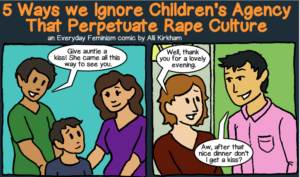
Source: Getty Images
Originally published on The Good Men Project and cross-posted here with their permission.
Joanna Schroeder’s article on The Good Men Project, as well as Soraya Chemaly’s on Huffington Post, both do a great job of pointing out the problems, and even potential dangers, of dismissing boys’ destructive behavior with the axiom “Boys will be boys.” One difference between the two posts is with whom each writer finds the responsibility for the boys’ behaviour lies. Ms. Chemaly focuses on the parents:
“Not once did his parents talk to him about invading another person’s space and claiming for his own purposes something that was not his to claim. Respect for her and her work and words was not something he was learning. How much of the boy’s behavior in coming years would be excused in these ways, be calibrated to meet these expectations and enforce the “rules” his parents kept repeating? There was another boy who, similarly, decided to knock down her castle one day. When he did it his mother took him in hand, explained to him that it was not his to destroy, asked him how he thought my daughter felt after working so hard on her building and walked over with him so he could apologize. That probably wasn’t much fun for him, but he did not do it again.”
Ms. Schroeder hints that nature shares some of the blame:
“I have a degree in Women’s Studies, and I understand the ways in which we socialize our girls to be sweet and accommodating, while we teach boys to be physical and unyielding. But it wasn’t until I had kids of my own that I saw how often kids fulfill these expectations with minimal parental influence.”
In my opinion, it is indisputable that both nature and nurture influence children’s behavior. I do think children are born with innate characteristics, talents, and weaknesses. Any parent with more than one child – especially siblings of similar ages – will remark how different the children’s personalities are from one another. I have two children; a son, eight years old, and a daughter, six. He is more cerebral and analytical; she is more athletic and boisterous. While there is a healthy presence of bickering and play fighting between them, there are also strict rules in our house about using your hands in anger against another person, as well as consequences for name-calling and destruction of property. Most of our peers raise their children with similar guidelines. Society as a whole, however, still encourages the “Boys will be boys, and girls will be girls” mentality. These stereotypical philosophies, as well as the behaviours they foment, exist for many reasons.
1. Lack of Parental Intervention
A theme unintentionally discovered through interviews with anti-bullying specialists, family therapists, and school teachers was parents’ unwillingness to say “no” and to put into place consequences for their children’s misbehavior. Each of these specialists point to a lack of discipline at home as a principal factor underlying a child’s poor conduct. Experts’ unequivocal opinion of our generation of parents is: we don’t know how to say no. Teachers and school administrations are constantly challenged with “not my child” statements of defiance from parents. Parents either don’t recognize their children’s misbehavior, or lack the fortitude to put their child in the car and drive them home as a consequence to rude or destructive comportment. Parents also give tacit approval for boorish behavior by themselves being aggressive, either in the home or on the sidelines of the sports field.
2. Parents Reinforce Behavior
One only need look at themed birthday parties for young children to understand that, while the seeds for gender roles may be present at birth, they are certainly culturally reinforced. Boys’ parties will have pirate themes, or Star Wars themes; girls’ parties still focus on princesses and other more feminine mainstays. Is there anything wrong with that? No. I also don’t believe it is necessarily our role to create a homogeneous, sexless society. However, when your son is looking for a sword or your daughter is waiting to be rescued, it’s important to understand some of the influences on that behavior. Our generation is (outwardly, at least) espousing the philosophy of gender role elimination in the workplace. The seeds of confidence and future possibilities are learned from a very young age. The question is not whether it is wrong for girls to have princess parties, but whether we are also telling our daughters “Pirate parties are for boys” and telling our sons “Figure skating is for girls.” In refusing experiences to our children based on their gender, we are reinforcing a feeling of shame in them for having that interest in the first place.
3. Peer Pressure
The battle between parental influence and peer pressure on children is a monster. As much as we may instill fairness, open-mindedness, respect, and a sense of right from wrong in our children, each of those will be tested once they leave the front door. Will they have the strength to say “no” to the beer or to the car keys? Will they be fearless when defending a victim of bullying or harassment? If nothing else, the Internet has proven we are still largely a culture of road-ragers. We are still prepared to hide in anonymity while either criticizing risk-takers or being fearful of supporting them. It is a special child who will resist ugly adolescent temptations. That level of confidence and strength is drawn largely from parental support at home.
4. Us Versus Them
Here we are, in the blogosphere, having stimulating, high-brow (occasionally naval-gazing) intellectual discussions about parenting. My experience, while either sitting in the stands at the arena or the ball field, or watching parents and kids in the playground or at vacation spots is: we are the minority. To many parents, “if someone hits you, you hit back” or “I drove plenty after one or two beers, and I’m fine” are acceptable. So, what do we do with that? After all, from those parents’ perspective it is also ‘Us Versus Them.’ The answer is: we do the best we can, and we do it out loud. — As brave as we need our children to be, that example must be set by us. It is not easy to face a brutish dad and ask him to stop yelling at the team bench. It is not easy to look at a parent and say, “I’m sorry, but that behavior is not acceptable in my house.” It’s not easy to look at your friend and say, “Language like that is not acceptable in front of my children.” Boys will always be boys. What kind of boys they are, is up to us parents. Unfortunately, most boys and girls are exactly the types of children society wants them to be.
[do_widget id=”text-101″]
Kenny Bodanis is the author of MenGetPregnantToo.com, and has been named by Reader’s Digest Canada as one of that country’s top parenting bloggers – the only dad on the list. He is currently editing his first parenting book and is a monthly parenting columnist on Montreal radio. Follow him on Facebook, Twitter, and Google +.
Search our 3000+ articles!
Read our articles about:
Our online racial justice training
Used by hundreds of universities, non-profits, and businesses.
Click to learn more




















